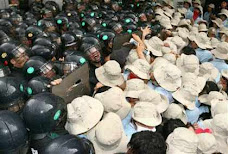
BANGKOK: One month after a powerful cyclone struck Myanmar and 10 days after the ruling junta's leader promised full access to the hardest-hit areas, relief agencies said Monday that they were still having difficulty reaching hundreds of thousands of survivors who are in urgent need of assistance.
Over the past week, they said, the door has opened slightly and a number of foreign experts have been allowed to travel into the Irrawaddy Delta, which bore the brunt of the May 3 storm. A modest flow of food, medicine and other supplies has begun to enter the delta by truck and barge.
But the agencies said that travel permits for international experts are limited and irregular and that dozens of relief workers remained stranded in the main city, Yangon.
"Several have been able to make essentially day trips to work with our field staff there," Paul Risley, a spokesman for the United Nations World Food Program, said Monday. "But access remains a continuing challenge."
A spokesman for the UN disaster relief agency said Monday that as of two days before, 15 foreign experts representing UN agencies were in the delta.
Analysts of Myanmar said they feared that the junta was playing a game of hints, promises and deception that it has used successfully over the years to deflect criticism from abroad.
"In all these crises that the Burmese face, there always is the teaser to take the pressure off the government," said Josef Silverstein, an expert on Myanmar at Rutgers University. "They seem like they are going to cooperate, and just as soon as comment dies down, anything that is going to be useful dies with it," he said. "Look back at the 'saffron revolution,' when they made all kinds of promises about what they were going to do and nothing happened."
He was referring to a peaceful uprising led by monks that was crushed in September. The junta's promises included a dialogue with the democracy leader Aung San Suu Kyi, but it dropped the idea after international attention had moved on.
In Geneva, the outgoing United Nations high commissioner for human rights, Louise Arbour, said the failure of the world to pressure Myanmar more strongly on human rights issues made it easier for the junta to keep out cyclone relief. "The obstruction to the deployment of such assistance illustrates the invidious effects of long-standing international tolerance for human rights violations," she said.
The United Nations estimates that 2.4 million people were severely affected by the cyclone and said last week that 1.4 million of those remained in desperate need of food, clean water, shelter and medical care. The government says that 134,000 people died or are missing.
International relief agencies have complained strenuously that the junta that rules the country was barring foreign aid and foreign relief workers from the worst-affected areas and endangering the lives of the survivors.
On May 28 in Yangon, the UN secretary general, Ban Ki Moon, said the junta's leader, Senior General Than Shwe, had promised free access to foreign aid workers. Two days later, at a donor conference in Yangon, foreign nations pledged about $150 million in aid but most said it was contingent on access by foreign relief workers.
Returning to New York, Ban said that the government "appears to be moving in the right direction" and that "I hope, and I believe, that this marks a new spirit of cooperation between Myanmar and the international community."
But relief workers said it was precisely the spirit of cooperation that was missing. After a 10-day delay, the junta allowed the first of 10 World Food Program helicopters to carry supplies from Yangon into the delta. The other nine were in Thailand en route to Myanmar, Risley said. He also said that barges and smaller craft were delivering supplies to hard-hit areas.
The government has allowed U.S. aircraft to land with relief materials but has barred American workers from leaving Yangon Airport to deliver them. It has turned away U.S., French and British naval vessels loaded with supplies.
In defiance of the views of the international community, the junta insists the emergency phase of the disaster has passed and according to various accounts has begun forcing survivors from shelters back into the devastated countryside.
According to Human Rights Watch, thousands of displaced people have been evicted from schools, monasteries and public buildings.
Anupama Rao Singh, regional director of the UN Children's Fund, warned after a visit to the hard-hit Irrawaddy Delta that any resettlement would be premature, even if it was voluntary.
"Many of the villages remain inundated with water, making it difficult to rebuild," she said. "There is also a real risk that once they are resettled, they will be invisible to aid workers. Without support and continued service to those affected, there is a risk of a second wave of disease and devastation."
The government also said it would reopen schools with the start of the new term this week, though many school buildings were destroyed and many teachers were swept to their deaths. Unicef said that more than 4,000 schools serving 1.1 million children were damaged or totally destroyed by the storm and more than 100 teachers were killed.
"I think the generals are doing what they do best, taking charge of everything, trying to keep themselves in complete control," said Aung Naing Oo, a Burmese political analyst who lives in Thailand.
"The military has this colonial trauma," he said. "They say, 'Under the British for more than a hundred years we were enslaved.' They view the pressure as a new form of neocolonialism."































No hay comentarios:
Publicar un comentario